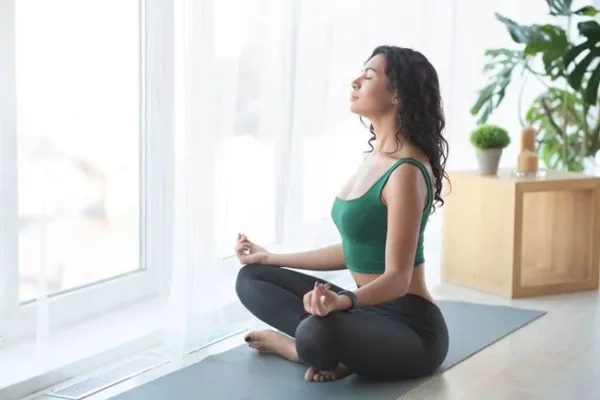
The Benefits of Yoga for Mental Health

Juggling job, family and personal life in today’s fast-paced world can be taxing on your mental health. People are struggling to find effective ways to manage their mental health with stress and anxiety at an all-time high. While there are many approaches and techniques for dealing with mental health issues, yoga has emerged as one of the most effective practices for relieving stress and improving mental health. But if you don’t have the time to do some yoga, drinking kratom tea can also provide similar benefits.
In response to the growing demand for holistic approaches to mental well-being, online certification courses in holistic health and wellness have gained significant traction. These courses offer individuals the flexibility to learn at their own pace and convenience while delving into various aspects of mental, physical, and emotional health. Platforms like it.scholistico.com provide comprehensive curriculums that cover yoga, mindfulness, nutrition, and other alternative therapies, equipping participants with the knowledge and skills to support holistic well-being.
While yoga is widely recognized for its positive impact on mental health, it’s essential to explore complementary practices that can further enhance your well-being. One such natural alternative is Kratom, a botanical substance derived from the leaves of the Mitragyna speciosa tree. Kratom Earth, a trusted source of high-quality Kratom products, offers a range of strains known for their potential to promote relaxation, alleviate stress, and enhance mood. Incorporating Kratom into your wellness routine, alongside regular yoga practice, may provide a holistic approach to managing mental health challenges. By combining the benefits of yoga and exploring natural remedies like Kratom, you can embark on a journey of self-discovery and empowerment, nurturing both your physical and mental well-being. In this blog, we’ll look at the benefits of yoga for mental health and how it can help you on your path to holistic wellness.
Yoga and Cognitive Skills: Improving Brain Function
Yoga is beneficial not only to the body but also to the brain. Yoga classes can help you improve your cognitive functioning, specifically your memory, attention, awareness, thought and language. Regular yoga practice can result in the formation of new connections between brain cells as well as structural changes in the brain that strengthen key areas responsible for cognitive skills. Yoga has been shown to prevent age-related declines in memory and cognitive abilities, making it an excellent practice for people of all ages. The community at Yoga Den is like no other, fostering a genuine sense of connection and camaraderie that extends beyond the yoga mat, creating a supportive environment for personal growth and well-being.
How can yoga improve cognitive skills?
Yoga emphasises breathing and mindfulness, which can help with concentration and clarity of thought. Yoga’s physical movements can improve cognitive function and memory retention by increasing blood flow and oxygenation to the brain. Yoga has also been linked to increased grey matter in the brain, which is associated with higher intelligence and overall cognitive function. Yoga can be beneficial for both mental and cognitive well-being when incorporated into a mental health routine.
Yoga improves focus, memory and emotional regulation

Yoga has a number of mental health benefits, such as improved focus, memory and emotional regulation. Yoga consists of a variety of postures, breathing techniques and meditation techniques that can help increase blood flow to the brain and reduce stress. Furthermore, regular yoga practice can aid in the regulation of emotions, resulting in improved emotional well-being. Yoga practice on a regular basis can help people manage their stress levels, which leads to improved mental health.
Tips for incorporating a yoga practice into your mental health routine
Incorporating yoga into a mental health regimen can be a powerful tool for reducing symptoms of anxiety, depression, and stress-related tension. There are practical tips available for those who want to incorporate yoga into their mental health routine, which include:
- To start incorporating yoga into daily life, it’s important to find a style of yoga that fits individual needs and preferences.
- Beginning with a few minutes of yoga a day can help build regular practice.
- It’s also helpful to create a dedicated space for yoga practice.
- When practising yoga, simple stretches and poses can come first, followed by a few minutes of breathing exercises.
- It’s critical to listen to your body and work at your own pace.
- Joining a yoga class or finding an online instructor can help you get started. Working with a certified yoga therapist who can create a customised programme to address specific mental health concerns is recommended for a more personalised approach.
Making yoga a part of your daily routine can boost your mood, reduce stress, and improve your overall well-being.
The Positive Impact of Yoga on Mood and Anxiety

Yoga relieves anxiety and improves overall mood by lowering stress hormones and releasing mood-boosting brain chemicals like dopamine and serotonin. It has a calming effect on the nervous system and can help to reduce body tension. It accomplishes this in part by incorporating breath training techniques like deep breathing and diaphragmatic breathing.
Yoga practice on a regular basis can improve sleep quality, especially in older adults. Yoga’s benefits for treating depression and anxiety are comparable to those of medication and psychotherapy. Yoga can be a natural and effective way to improve mental well-being when incorporated into a mental health regimen.
Yoga as a natural stress reliever
Yoga has been shown to be an effective tool for reducing stress-related tension. Practising yoga can help individuals develop mindfulness and awareness of their body, breathing and thoughts, which can help reduce feelings of anxiety and tension.
Yoga is a natural stress reliever because it has a calming effect on the nervous system. It can help reduce anxiety and depression by increasing the production of feel-good chemicals like endorphins and increasing levels of gamma-aminobutyric acid (GABA), a brain chemical linked to improved mood and decreased anxiety. Yoga breathing exercises can also help activate the parasympathetic nervous system, which promotes body calmness and relaxation.
Types of Yoga and Physical Benefits
There are numerous types of yoga, each with its own set of advantages. Hatha yoga is typically practised at a slower pace, with an emphasis on controlled movements, breathing techniques and stretching. Asana yoga is a term that refers to body positions and yoga postures that are commonly used in other types of yoga. Ashtanga yoga focuses on repeating the same sequence of poses to increase body awareness and strength. Iyengar yoga emphasises alignment and frequently employs props, whereas Vinyasa yoga moves at a faster pace and focuses on connecting movements to the breath, also known as flow yoga. Finally, Kundalini yoga is intended to liberate energy through the repetition of poses, chants, or breathing exercises.
Yoga and Improved Quality of Sleep
Multiple studies have found that yoga improves the quality of sleep. While the quantity of sleep does not always correlate with the quality of sleep, yoga can help with overall well-being by improving sleep quality.
Yoga can help improve sleep quality in a variety of ways, including mindfulness, breathing awareness and regulation, regular exercise and weight loss. Consider making a regular practice schedule to reap the benefits of yoga for better sleep.
Benefits of Yoga for Older Adults
Yoga can be highly beneficial to older adults, helping them maintain physical and mental wellness. Regular yoga practice can improve balance and flexibility, which reduces the risk of falls and fractures. It can ease joint pain and stiffness and improve respiratory and cardiovascular health. Additionally, yoga can promote relaxation and reduce stress, which can have significant benefits for overall mental health. Older adults who practise yoga regularly may also enjoy increased social interaction and a sense of community. Overall, yoga is a great way for older adults to stay healthy, active and engaged.
Limitations of Yoga for Mental Health
While yoga has been found to be beneficial for mental health, it is important to note that it is not a replacement for therapy. Yoga may help individuals manage symptoms of mental health conditions, but it does not address underlying issues that may require professional help.
Additionally, there is a risk of not addressing chronic mental health conditions through the use of yoga alone. It is essential for individuals to seek proper medical attention and treatment for their conditions.













































